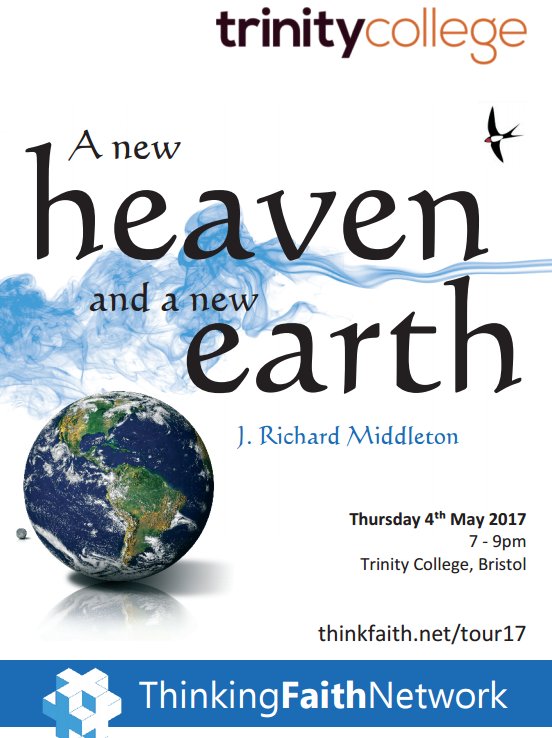J. Richard Middleton at Trinity College 4 May 2017.
The lecture covered the full gamut of scripture from Genesis to Revelation; from creation to eschaton. The tour was organised by ThinkingFaith Network.
Below are a few selections from my copious notes taken at the time (they obviously don’t fully represent all that Richard said and at times may have inadvertently misrepresented him).
Starting with creation and looking at Proverbs 3, 24 and Job 38 he showed that the cosmos, the creation was seen as a building. Heaven is also part of creation. Although the sky/ heaven was seen as transcendent and as a symbol of God’s place it is also part of the created cosmos. This view is contrary to much of modern theology that sees heaven as uncreated. God indwells the cosmos.
Earth is part of the human realm (Ps 115:16). The entire creation is called to worship. In Genesis we have a macrocosmic tabernacle. All of creation is made to worship God. We have a far too anthropocentric view of worship. Stars, mountains, … are created to worship God. How do they do that? By being mountains, by being stars … How are humans to worship? By being humans!
Part of being human is to transform our environment. This is idea captured in what is called the cultural mandate. The creation was described as very good - but not perfect! Contra Augustine creation was not instantaneous, but rather a process: a shaping of the wild waste into cosmic dwelling. There was an expectation that humans actualize the God-given potential. This is our Royal task, our sacred calling.
This idea turns on its head the Ancient Near Eastern idea of kings and humanity. The cosmos was seen as a building but the king as God’s representative was the builder.
This worldview is subverted by the scriptures:
There is not an elite that is the image or representative of God but the entire human race are all created in the image of God. The Bible radically democratises/ universalises the image of God. Israel is the only known nation without a king (unit 11th century)! All of the nation is to be a royal priesthood, to bring mediation, blessing to all.
Humanity is God’s prism – creation is refracted into cultural activities. However, sin blocked that developmental task. God’s presence has not filled the earth yet. But he has not given up on his creation: there is cosmic redemption. The scope of salvation in the New Testament is comprehensive. Five key biblical texts give ample evidence of this – the table is a summary:
Salvation in the New Testament is seen as restorative, comprehensive and holistic.
The ‘world’ in John 3:16 is meant to be seen in the most comprehensive sense possible.
1 Cor 15 – ‘so that God may be all in all’.
In Revelation 21 we have the removal of the curse, a reversal of Genesis 3:17 in Revelation 22 the throne is shifted to earth.
This renewal of all things changes everything. All of life!
“God doesn’t make junk; and God doesn’t junk what he makes.”
Much of the lecture was drawn from material in two of Richard's recent books:
The Liberating Image. Grand Rapids, MI: Brazos Press, 2005
A New Heaven and a New Earth. Grand Rapids, MI: Baker Academic, 2014 - see my review here








No comments:
Post a Comment